
Viking Names
Bruni
Brúni is a weak variant of Brúnn, originally an Old Norse male byname meaning ‘brown’. The latter name is recorded in some Norwegian place-names, but the independent instances may be loans from Continental Germanic. The weak form of the name, Brúni, was the name of one of the original settlers of Iceland in Landnámabók ‘The Book of Settlements’, but this name soon dropped out of use in Norway. The weak form is common in Swedish runic inscriptions (as bruni) and occasionally appears in Denmark. Brúni may be the first element in the place-name Brumby, Lincolnshire.
Read More

Viking Names
Brumby
The first element of the place-name Brumby, in the Manley Wapentake of Lincolnshire, is likely the Old Norse male personal name Brúni, although it has also been suggested it could be the Old Norse element brunnr ‘a well, spring’. The second element is bý ‘a farmstead, a village’.
Read More

Viking Names
Saxi
Saxi was originally a byname derived from Old Norse noun sax ‘short, one-edged sword’, but possibly in some instances derived from an ethnonym from the name of the Saxons. An original East Scandinavian name, it is fairly common in Sweden and very common in Denmark. The name is rare in Iceland, although it is borne by one individual in the settlement period (c. 870-930). Although common in Eastern Norway, there is only a single instance of the byname Sax is recorded in West Scandinavia in the tenth century. Saxi is found in several place-names in Normandy. It is well-attested in Lincolnshire and Yorkshire although some forms may represent the Continental Germanic male personal name Saxo. Occasionally it is difficult to determine whether the first element in place-names such as Saxby All Saints, Lincolnshire and Saxby, Leicestershire is Saxi or the Scandinavian genitive plural form of an ethnonym: Old English S(e)axe, Old Norse Saxar ‘Saxons’.
Read More
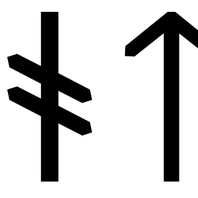
Viking Names
Fot
The Old Norse male personal name Fótr is the name of a fairly prolific Swedish rune-carver and is found elsewhere in Scandinavia. In England, the name occurs in several place-names in Lincolnshire (Fotherby, Fosdyke and Foston), Foston, Leicestershire, and possibly in another Foston in Derbyshire. In Fotherby, the place-name preserves the original Old Norse genitive singular ending (ie. as in Fótar). Such clear indications of Old Norse grammar survive relatively rarely in modern forms of place-names. Originally, Fótr was a by-name, meaning ‘foot’.
Read More

Viking Names
Welby
Welby, in the Framland Hundred of Leicestershire, is a Scandinavian compound from the Old Norse male personal name Āli and the Old Norse element by ‘a farmstead, a village’.
Read More
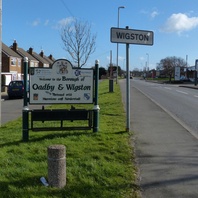
Viking Names
Oadby
Oadby, in the Guthlaxton Hundred of Leicestershire, likely comes from the Old Norse male personal name Auði (Old Danish Øthi) which appears as Owði in the Liber Vitate of Thorney Abbey. A potential alternative for the first element is Old Norse auðr ‘wealth, riches’, which might refer to the easily worked and fertile glacial sand and gravel on which Oadby lies. The second element of the place-name is Old Norse by ‘farm, settlement’. It is now a joint village with Wigston Magna.
Read More
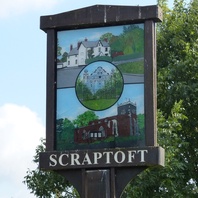
Viking Names
Scraptoft
There are two possibilities for the first element of Scraptoft, in the Gartree Hundred of Leicestershire. The first suggestion is that it is the Old Norse male personal name Skrápi (genitive singular Skrápa). Alternatively, the specific could be the Old Norse element skrap ‘scraps, scrapings’ potentially referring to arid barren soil which may be related to Modern Norwegian skrapmark ‘land thinly covered by grass’. This would be topographically appropriate as the settlement lies on a small area of sand and gravel on top of boulder clay. The second element of the name is Old Norse toft ‘building plot, homestead, curtilage’.
Read More
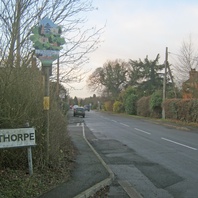
Viking Names
Winthorpe
Winthorpe, in the Newark Wapentake of Nottinghamshire, comes from either the Old English make personal name Wigmund or its Scandinavian equivalent Vígmundr and Old Norse þorp ‘a secondary settlement, a dependent outlying farmstead or hamlet’.
Read More

Viking Names
Brocklesby
Brocklesby, in the Yarborough Wapentake of Lincolnshire, comes from the postulated Old Norse personal name Bróklauss and the Old Norse element bý ‘a farmstead, a village’. The first element is originally a nickname meaning ‘without breeches’ and is likely an Anglo-Scandinavian formation.
Read More
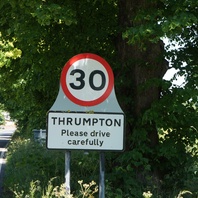
Viking Names
Thrumpton
Thrumpton, in the Rushcliffe Wapentake of Nottinghamshire, comes from the Old Norse male personal name Þórmóðr and the Old English tun ‘farm, settlement’. Thus it is an Anglo-Scandinavian hybrid name. There is a place of the same name, with the same origin, in the Bassetlaw Wapentake.
Read More
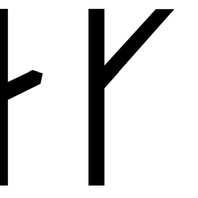
Viking Names
Ragni
Ragni is a short form of names in Ragn-, related to Old Norse regin, genitive plural ragna, ‘ruling powers, the gods’. The personal name element probably has the sense of ‘advice’, but it may indicate ‘the gods’, as it does in Ragnarök, the name of the apocalypse in Old Norse mythology. A few late instances of the personal name are recorded in West Scandinavia, it is recorded in several runic inscriptions in Sweden. Also, Ragni is the first element of the place-name Ragnall, Nottinghamshire.
